Gut Health and Child Survival
March 20, 2025
Enterics for Global Health (EFGH) Coordination Team nominated for UW Distinguished Staff Award
Categories: Awards, Gut Health and Child Survival
Staff members of the Enterics for Global Health (EFGH) Coordination Team have been nominated for a University of Washington (UW) Distinguished Staff Award in recognition of their contributions to advancing equity within global health research consortium models and implementing systems and programs that support early career investigators and researchers in low- and middle-income countries (LMICs).

The team includes (pictured top row from right to left): Hannah Atlas (Research Manager), Erika Feutz (Data Manager), Sean Galagan (Senior Data Manager), Anya Lewin (Program Operations Specialist). Pictured bottom row from right to left: Chloe Morozoff (Research Assistant), Sonia Rao (Program Specialist), Olivia Schultes (Data Manager), and Alyson Shumays (Global WACh Co-Director as Program Manager). (more…)
December 2, 2024
Enterics for Global Health (EFGH) Phase C aims to assess policymaker preferences on Shigella vaccine characteristics
Categories: Awards, Gut Health and Child Survival, Implementation Science, Research
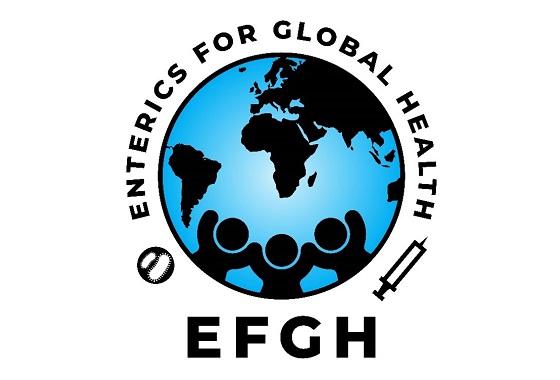
The Enterics for Global Health (EFGH): Shigella surveillance study was launched in 2022 and aims to establish incidence and consequences of Shigella diarrhea among children 6-35 months in Bangladesh, Kenya, Malawi, Mali, Pakistan, Peru, and The Gambia and inform future Shigella vaccine trial planning. The study protocol has been published in a supplement in Open Forum of Infectious Diseases. During Phases A and B, the EFGH Consortium built a robust collaborative research infrastructure to facilitate shared scientific decision making and protocol standardization, and recently completed enrollment of 9,476 participants in August 2024.
(more…)
November 27, 2024
Enterics for Global Health (EFGH) Symposium hosted at the American Society of Tropical Medicine & Hygiene annual meeting
Categories: Conferences, Gut Health and Child Survival, Research
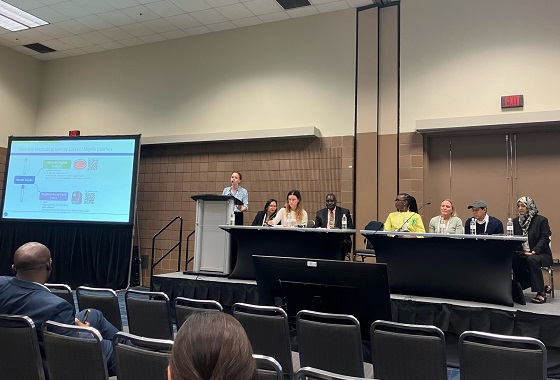
The symposium was titled: “Preliminary results from The Enterics for Global Health (EFGH) Shigella surveillance study- preparing for Shigella vaccine trials in the target population of young children living in low- and middle-income countries” and aimed to: (more…)
November 1, 2024
Environmental Enteric Dysfunction Biopsy Initiative (EEDBI) Consortium publishes supplement in the American Journal of Clinical Nutrition
Categories: Gut Health and Child Survival, Publication

Dr. Donna Denno (Global WACh’s Associate Director of Pediatrics and faculty in the UW Departments of Pediatrics, Global Health, and Health Systems and Population Health) co-led an 8-paper supplement recently published in the American Journal of Clinical Nutrition.
The Environmental Enteric Dysfunction Biopsy Initiative: An Intensive Prospective Multicenter Analysis supplement consists of an introductory article, The Environmental Enteric Dysfunction Biopsy Initiative (EEDBI) Consortium: Mucosal Investigations of EED, and seven research papers. The papers represent the most comprehensive assessment of the pathophysiology of EED, which is highly prevalent and a major cause of poor child growth and development in low-resource settings. The papers reflect years of research by numerous collaborators across the globe. (more…)
August 26, 2024
Register for the DeWorm3 Study’s Primary Results Webinar on September 25, 2024
Categories: Gut Health and Child Survival, Research
Please join the DeWorm3 Study for a special scientific webinar to hear primary results on September 25th, 2024 from 1-3 PM UTC.
DeWorm3 has contributed a significant body of research on the feasibility of interrupting soil-transmitted helminth (STH) transmission through community-wide mass drug administration (cMDA) in Benin, Malawi and India. Visit their website to learn more about the objectives, team members, and publications.
Registration is required to receive the webinar link. Click the flyer or scan the QR code below to register today! (more…)
August 23, 2024
Dr. Ruchi Tiwari receives NIH Postdoctoral Fellowship to study the association of maternal factors and child neurodevelopment in Kenya
Categories: Awards, Gut Health and Child Survival, Research
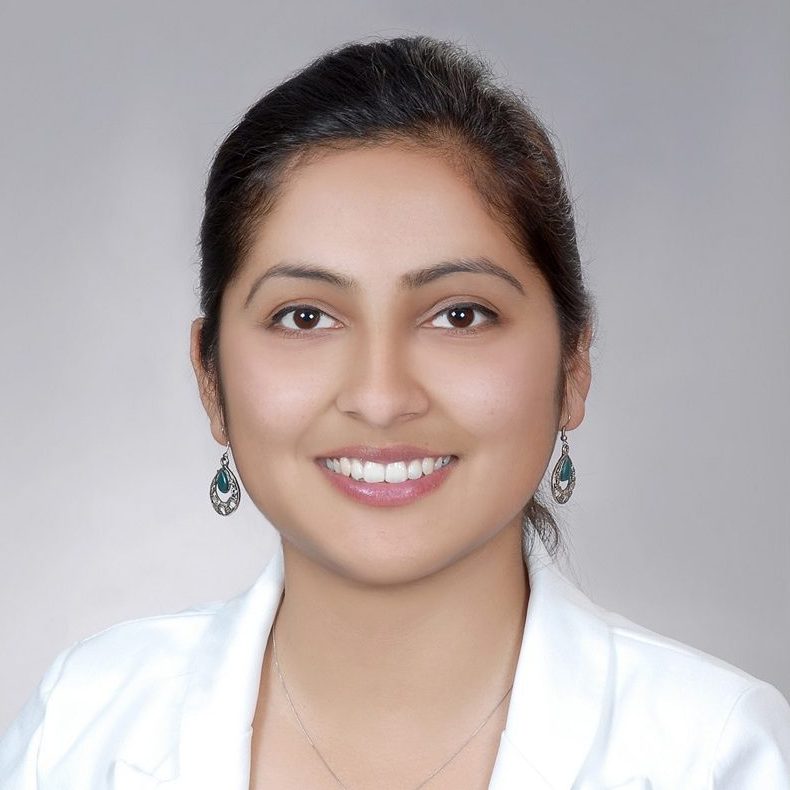 Congratulations to Dr. Ruchi Tiwari for receiving an NIH F32 Postdoctoral Fellowship Award that aims to enhance the research training of promising postdoctoral candidates who have the potential to become productive, independent investigators. This funding will allow her to continue training at Global WACh under the mentorship of Dr. Christine McGrath (Associate Professor, Global Health and Adjunct Associate Professor, Epidemiology) and faculty within the Gut Health and Child Survival scientific priority area.
Congratulations to Dr. Ruchi Tiwari for receiving an NIH F32 Postdoctoral Fellowship Award that aims to enhance the research training of promising postdoctoral candidates who have the potential to become productive, independent investigators. This funding will allow her to continue training at Global WACh under the mentorship of Dr. Christine McGrath (Associate Professor, Global Health and Adjunct Associate Professor, Epidemiology) and faculty within the Gut Health and Child Survival scientific priority area.
Dr. Tiwari plays a leading role in pediatric studies on gut health and malnutrition in Kenya alongside investigators at the Kenya Medical Research Institute (KEMRI). These studies involve understanding the effects of breast-milk derived nutrition supplements (human milk oligosaccharides or HMOs) on infant health outcomes. She will leverage her skills to assess how maternal factors that can be changed or controlled (e.g. stress, infection, and inadequate nutrition during and after pregnancy) influence child neurodevelopment at 2 years of age, with an important focus on the difference in the composition of HMOs by those factors. (more…)
August 16, 2024
Enterics for Global Health (EFGH) leverages international research consortium to train and mentor investigators across career stages
Categories: Gut Health and Child Survival
The Enterics for Global Health (EFGH) research consortium, supported by faculty and staff at Global WACh, is an exemplary model of advancing institutional efforts to support research mentorship. The objective of EFGH is to establish the incidence and consequences of Shigella diarrhea in Bangladesh, Kenya, Malawi, Mali, Pakistan, Peru, and The Gambia. EFGH also has a mission to ensure that the values, standards, and practices of science are effectively shared to the next generation of global health researchers.
Early-career investigators from EFGH partner institutions identified a need for seed funding, protected time, and support for scientific writing, data analysis, and mentorship to further advance their research careers. In response, EFGH developed structured programs to address those unmet needs. In September 2023, EFGH initiated a 16-month Manuscript Writing Certificate Program on the research-to-publication process and launched a second round of its Rising Star Program to support highly-talented junior scientists in becoming independent investigators. (more…)
June 5, 2024
2nd annual Global WACh Student Poster Symposium celebrates and highlights student achievements over the academic year
Categories: Certificate Program, Family Planning, Gut Health and Child Survival, HIV and Co-Infections, Research, students, Talks and Events
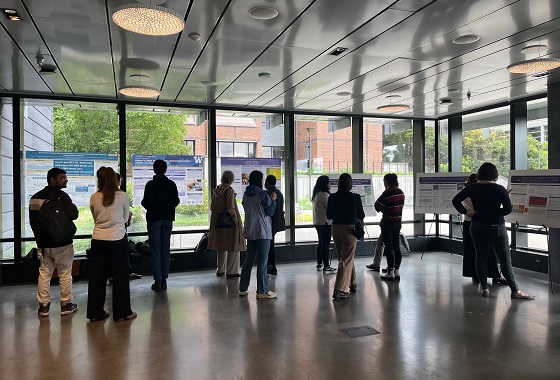
On May 28th in the Hans Rosling Center for Population Health, Global WACh hosted its second annual Student Poster Symposium featuring graduate student research aimed at improving the health and well-being of women, adolescents, and children. It was a celebratory end-of-year event to acknowledge students’ training, service, and achievement and give well wishes to those graduating UW.
This year’s symposium featured 14 posters by master’s and doctoral students and a postdoctoral fellow representing several departments and schools – Applied Bioengineering, Epidemiology, Global Health (General and Implementation Science tracks), Nursing, and Social Work. These included 90-hour capstone projects completed by students enrolled in the Global WACh Graduate Certificate Program, and master’s thesis and PhD dissertation-related posters by student supporting Global WACh’s research portfolio. Three posters were featured at scientific conferences over the academic year and shared with the UW global health community. (more…)
June 3, 2024
Global WACh faculty, staff, students attend a team retreat to build community and advance strategic initiatives
Categories: Family Planning, Gut Health and Child Survival, HIV and Co-Infections, Talks and Events
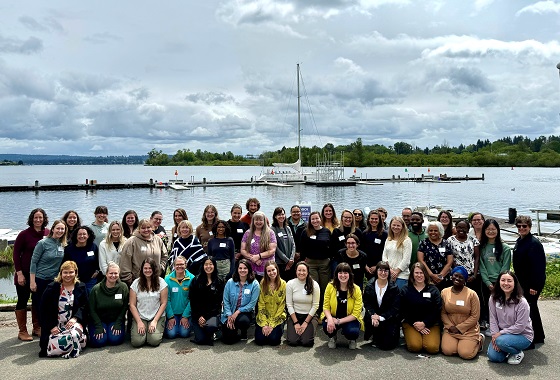
On May 22nd, Global WACh hosted an all-day team retreat at the UW Waterfront Activities Center. 46 faculty, staff, and student trainees spent the day together with the goals of 1) team building across Global WACh’s scientific priorities, and 2) advancing strategic initiatives for scientific impact, deep work, and expanding diversity, equity, and inclusion in our community. The retreat was part of a larger “Think Week” aimed at protecting time and space for creative thinking to expand innovation to improve the health of women, adolescents, and children. (more…)
April 29, 2024
Gut Health team shares experience supporting research consortiums at CUGH 2024
Categories: Conferences, Gut Health and Child Survival, Research
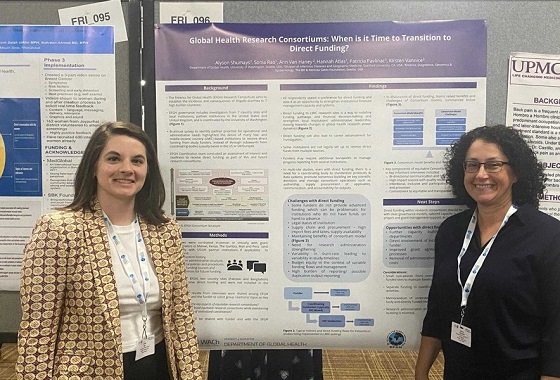
Sonia Rao (Project Manager) and Alyson Shumays (Director of Research Operations) at CUGH 2024.
Global WACh team members, Sonia Rao and Alyson Shumays, attended the 2024 Consortium of Universities for Global Health (CUGH) Conference, held from March 7-10, in Los Angeles, CA to share what they’ve learned from supporting international research consortiums under the Gut Health and Child Survival research portfolio.
This year’s theme, “Global Health Without Borders: Acting for Impact,” created an environment for scientists, students and implementers from academia, NGOs, government, and the private sector to learn, share research, collaborate, and develop partnerships to address global health challenges. Global WACh featured two poster abstracts under one of seven subthemes, “Decolonizing – Reforming Global Health Equity, Justice, Global Health Education and Research.” Click the titles below to view the posters. (more…)
Previous page Next page